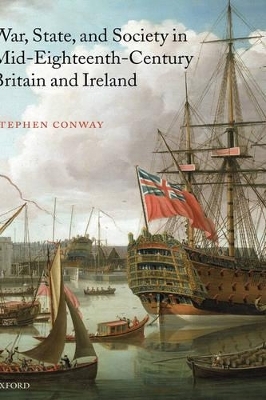
War, State, and Society in Mid-Eighteenth-Century Britain and Ireland
Seiten
2006
Oxford University Press (Verlag)
978-0-19-925375-3 (ISBN)
Oxford University Press (Verlag)
978-0-19-925375-3 (ISBN)
Explores the impact of wars on Britain and Ireland, looking at the mobilization of manpower, resources, and money to fight the wars, and the consequences for the economy, society, politics, religious divisions, national consciousness, as well as attitudes to empire.
This book explores the impact of the wars of 1739-63 on Britain and Ireland. The period was dominated by armed struggle between Britain and the Bourbon powers, particularly France. These wars, especially the Seven Years War of 1756-63, saw a considerable mobilization of manpower, materiel and money. They had important affects on the British and Irish economies, on social divisions and the development of what we might term social policy, on popular and parliamentary politics, on religion, on national sentiment, and on the nature and scale of Britain's overseas possessions and attitudes to empire.
To fight these wars, partnerships of various kinds were necessary. Partnership with European allies was recognized, at least by parts of the political nation, to be essential to the pursuit of victory. Partnership with the North American colonies was also seen as imperative to military success. Within Britain and Ireland, partnerships were no less important. The peoples of the different nations of the two islands were forced into partnership, or entered into it willingly, in order to fight the conflicts of the period and to resist Bourbon invasion threats. At the level of 'high' politics, the Seven Years War saw the forming of an informal partnership between Whigs and Tories in support of the Pitt-Newcastle government's prosecution of the war. The various Protestant denominations - established churches and Dissenters - were brought into a form of partnership based on Protestant solidarity in the face of the Catholic threat from France and Spain. And, perhaps above all, partnerships were forged between the British state and local and private interest in order to secure the necessary mobilization of men, resources, and money.
This book explores the impact of the wars of 1739-63 on Britain and Ireland. The period was dominated by armed struggle between Britain and the Bourbon powers, particularly France. These wars, especially the Seven Years War of 1756-63, saw a considerable mobilization of manpower, materiel and money. They had important affects on the British and Irish economies, on social divisions and the development of what we might term social policy, on popular and parliamentary politics, on religion, on national sentiment, and on the nature and scale of Britain's overseas possessions and attitudes to empire.
To fight these wars, partnerships of various kinds were necessary. Partnership with European allies was recognized, at least by parts of the political nation, to be essential to the pursuit of victory. Partnership with the North American colonies was also seen as imperative to military success. Within Britain and Ireland, partnerships were no less important. The peoples of the different nations of the two islands were forced into partnership, or entered into it willingly, in order to fight the conflicts of the period and to resist Bourbon invasion threats. At the level of 'high' politics, the Seven Years War saw the forming of an informal partnership between Whigs and Tories in support of the Pitt-Newcastle government's prosecution of the war. The various Protestant denominations - established churches and Dissenters - were brought into a form of partnership based on Protestant solidarity in the face of the Catholic threat from France and Spain. And, perhaps above all, partnerships were forged between the British state and local and private interest in order to secure the necessary mobilization of men, resources, and money.
Stephen Conway is Professor of Hisotry at University College London. He has written extensively on the War of American Independence, and is also the editor of three volumes of the correspondence of the philosopher Jeremy Bentham.
Introduction ; 1. World-Wide War and Home Defence ; 2. War and the State ; 3. The Growth of the Armed Forces ; 4. War and the Economy ; 5. War and Society ; 6. War and Politics ; 7. War and Religion ; 8. War and the Nation ; 9. War, Empire, and the Loss of America ; 10. The View from the Grassroots ; 11. Comparisons Historical and Geographical ; Conclusions ; Bibliography ; Index
| Erscheint lt. Verlag | 1.3.2006 |
|---|---|
| Zusatzinfo | 3 maps, 4 tables, 1 figure |
| Verlagsort | Oxford |
| Sprache | englisch |
| Maße | 163 x 242 mm |
| Gewicht | 671 g |
| Themenwelt | Geschichte ► Allgemeine Geschichte ► Neuzeit (bis 1918) |
| Geisteswissenschaften ► Geschichte ► Regional- / Ländergeschichte | |
| Geschichte ► Teilgebiete der Geschichte ► Kulturgeschichte | |
| Geschichte ► Teilgebiete der Geschichte ► Militärgeschichte | |
| Geschichte ► Teilgebiete der Geschichte ► Sozialgeschichte | |
| ISBN-10 | 0-19-925375-7 / 0199253757 |
| ISBN-13 | 978-0-19-925375-3 / 9780199253753 |
| Zustand | Neuware |
| Haben Sie eine Frage zum Produkt? |
Mehr entdecken
aus dem Bereich
aus dem Bereich
Europa 1848/49 und der Kampf für eine neue Welt
Buch | Hardcover (2023)
DVA (Verlag)
48,00 €
Giordano Bruno - ein ketzerisches Leben
Buch | Hardcover (2024)
C.H.Beck (Verlag)
29,90 €


